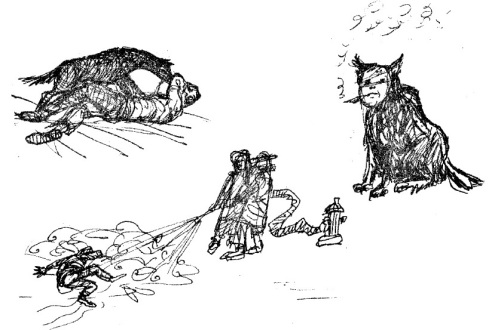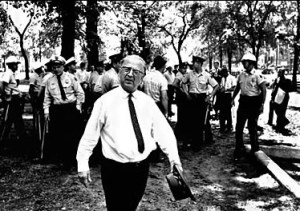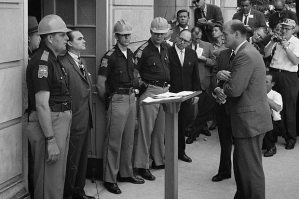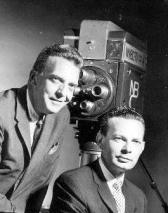Anyone unprepared for this song will already have been warned as to its content by Talking Vietnam, Phil’s previous talking blues effort that appears on All The News That’s Fit To Sing. In that instance Vietnam was introduced to us as “Southeast Asian Birmingham”. Birmingham then must be “Southeast American Vietnam”. The inference is clear – there is war raging in Birmingham just as there is in Vietnam. And what’s more, unless we take a stand, we the people are complicit.
It wouldn’t be long until Phil would stop writing explicitly about civil rights and racism (and songs about racism and civil rights don’t get any more explicit than Here’s To The State of Mississippi!) but the themes inherent in his civil rights songs are also present in his anti-war songs, indignation at the role of politicians, sympathy for those involved whether they be blacks or soldiers (or both) and an almost crazed incredulity at what his country was up to. As White Boots Marching In A Yellow Land gives a first person account of a foreign war zone, Talking Birmingham Jam gives us a first person account of a war raging closer to home.
*
“They said ‘Sure we have old Bull Conner,
There he goes a-walking yonder’”
This is Theophilus Eugene Conner, or Bull to his friends and enemies alike. A native of Birmingham since 1922, Connor ran in the Democratic Primary for a seat in the Alabama House of Representatives in 1934. Claiming that his candidacy was something of a joke his popularity as a sports commentator on local radio nevertheless saw him victorious.
He put himself forward as a plain speaking man of the people. So what if he didn’t graduate high school? He stood for low-taxes and segregation. He served as Commissioner of Public Safety in Birmingham from 1937 until 1952 and again (after a brief respite following a police corruption scandal and rumours of an extra marital affair) between 1957-1963, a role that saw him oversee the running of the police department. He also served as a Delegate to five Democratic National Conventions and in ’48 led the “Dixiecrat” walkout of Southern Delegates in protest over President Truman’s civil rights policies.
Sam Ostrow of the University of Alabama argues that Connor’s extreme, unadulterated bigotry (the Encyclopaedia of Alabama describes him as both an “icon of racial intolerance” and a “staunch and sometimes flamboyant white supremacist”) inadvertently helped bring about the giant strides towards Civil Rights that culminated in the 1964 Civil Rights Act. According to Ostrow Connor “became the face of bigotry in the segregated South, and was an easy figure to hate – and rally against”. Even President Kennedy is quoted as saying that “the civil rights movement should thank God for Bull Connor. He helped it as much as Abraham Lincoln.”
By 1963 Birmingham’s reputation as a hotbed of racialism was such that Dr. King called it a “symbol of hard-core resistance to integration”. The violent actions of segregationists were such that it had acquired the nickname Bombingham. The Reverend James Bevel, one of King’s key advisors and a fellow leader of the Southern Christian Leadership Conference came up with an idea. Sick of violence towards activists (in 1961 Freedom Riders had been set upon by the Ku Klux Klan in Birmingham, while the police did nothing allowing the beatings to continue unabated) he began organising what became known as the “Children’s Crusade”. Starting on the 2nd of May 1963 black public schools in Birmingham and across Jefferson County emptied as young black protesters, carrying placards and looks of proud defiance, took to the streets of Birmingham, protesting racial violence and segregation. By the 7th of March they numbered 3000. Bull Connor responded with mass arrests, high-pressured hoses and police dogs. Images of the protesters cowering from police with vicious dogs flooded the American media. By the 10th of May Connor’s position had become untenable. The protestors had scored a major victory. Dr King announced that “the walls of segrgation will crumble in Birmingham and they will crumble soon”.
According to Clayborne Carson, director of the Martin Luther King Jr. Research and Education Institute at Stanford University “the Children’s Crusade turned the tide of the movement”. Dr King wrote in his autobiography of the events that week in Birmingham as “the time of our greatest stress, and the courage and conviction of those students and adults made it our finest hour”.
Fifty years later Birmingham, Alabama has an African-American Mayor and a majority African-American City Council. After May 1963, in Dr King’s words, “The city of Birmingham discovered a conscience”.
Bull Connor died in 1973. Still wrong and still unrepentant.
*
“Well I said ‘there’s still something missing here
You must have a Governor somewhere?’”
The Governor of Alabama was George Corley Wallace Jr. and he was very much involved. Even a brief glimpse into the life of George Wallace reveals him to be a rather nasty boil on the backside of the United States. Wallace was a three-time Governor of Alabama and stood four times for President of the United States. He ran as an independent in 1968 and won a staggering 13.5% of the vote, meaning that some 10,000,000 Americans voted for him.
Elected Governor of Alabama in 1962 by a record margin he proudly proclaimed “segregation now, segregation tomorrow, segregation forever”. On June 11th 1963 he stood in the doorway of the Foster Auditorium building in the University of Alabama to physically stop African-American students from enrolling. The next day Medgar Evers died. These really were the days of decision.
*
“Cracking jokes…talking to Huntley Brinkley…”
The Huntley-Brinkley Report was the flagship NBC evening news programme, presented by Chet Huntley in New York and David Brinkley in Washington from 1956 until 1970. Wallace took umbrage with their reporting of events in Birmingham and sent them a telegram telling them so;
“I refer to your program of this date (May 13, 1963). Your coverage of this situation in Birmingham, Alabama amounted to a series of deliberate, unmitigated lies. Your management of the news is resented and is an affront to those dedicated law enforcement agencies of the State of Alabama, City of Birmingham and Jefferson County, Alabama, whose men risked their lives in an attempt to quell a vicious negro mob and, in fact, brought the violence of last Saturday night completely under control. I challenge you and the sponsors of your program to question the truth of my statement.”
George Wallace
Governor of Alabama.
*
“”Signed by Governor Wallace and Rin Tin Tin”
Rin Tin Tin was a famous dog. Not as famous as Lassie perhaps, but famous enough to be given a star on the Hollywood Walk of Fame, in 1963 coincidentally.
*
The August 1963 edition of Broadside magazine leads with a song that went down a storm as during Phil’s his set at the Newport Folk Festival the previous month. There are moments in Phil’s career were things happened just right. His set at Newport, and his performance of Talking Birmingham Jam in particular, is one such occasion. It’s inclusion on the cover of the very next edition of Broadside is perhaps testament to its success.
This was Phil playing to his people. Usually disparate, at Newport they were gathered en masse. This audience would get his politics, would automatically boo and hiss as Bull Conner’s name is mentioned, dig his Wood Guthrie reference and perhaps have a slight musical crush on this young, guitar in hand as the breeze blows the hair away from his face as he sings his songs of freedom.
Released on record nearly two years after performing it at Newport, Talking Birmingham Jam lost a little of its power and charm. Phil’s performance is slower, his voice deeper and less expressive. This was, near as dammit, old news. The second and last talking blues that Phil would release in his lifetime (though he wrote numerous others , it lacks a little of the cutting humour of Talking Vietnam. The main joke is a (that the city is being run by dogs) wears a little thin. As an instant reaction to a horrific news story it’s fine. As a considered treatise of it it is somewhat lacking. Back in Newport in July 1963 however, it was a little great and lucky for us that performance has been captured on record and on film.




